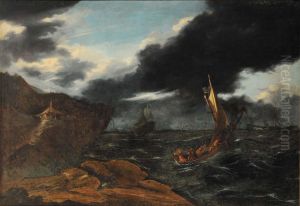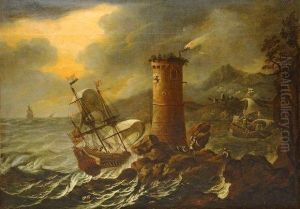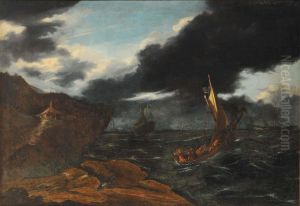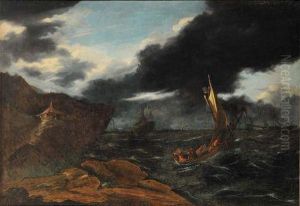Francesco M Borzone Paintings
Francesco Maria Borzone was an Italian painter of the Baroque period, born in 1625 in Genoa, part of the Republic of Genoa, which is now in modern-day Italy. He is known for his contributions to Italian Baroque painting, particularly in the Genoese school, where he developed a style that was influenced by his contemporaries and the prevailing artistic trends of the time.
Borzone was born into an artistic family; his father, Luciano Borzone, was also a painter, and he served as Francesco's initial teacher and mentor. Francesco's brother, Giovanni Battista Borzone, was an artist as well. Being part of a family of artists, Francesco was well integrated into the artistic community of Genoa and was exposed to the works of prominent painters such as Bernardo Strozzi, whose influence is evident in Borzone's use of color and dramatic lighting.
Throughout his career, Borzone developed a reputation for his religious works, which were commissioned by various churches and religious institutions in Genoa and its surrounding areas. His paintings often featured biblical and hagiographical subjects, rendered with a sense of realism and emotional depth that resonated with the spiritual fervor of the Counter-Reformation, which sought to use art as a means of religious expression and persuasion.
Borzone's work was characterized by a refined use of chiaroscuro – the contrast of light and shadow – to create a sense of three-dimensionality and to highlight the drama of his scenes. His compositions were typically well balanced, with careful attention to the placement of figures and the narrative flow of the scenes depicted.
Despite the quality of his work, Francesco M Borzone is not as well-known as some of his contemporaries, and his art has often been overshadowed by other Genoese painters such as Strozzi and the more famous Giovanni Benedetto Castiglione. Nevertheless, his contributions to the Genoese Baroque are significant, and his paintings can still be seen in churches and museums in the region.
Francesco Maria Borzone's life was relatively short; he died in 1679. Although he did not leave a large body of work, his paintings remain a testament to the vitality of the Genoese school of painting during the Baroque era and provide insight into the religious and artistic culture of 17th-century Italy.



